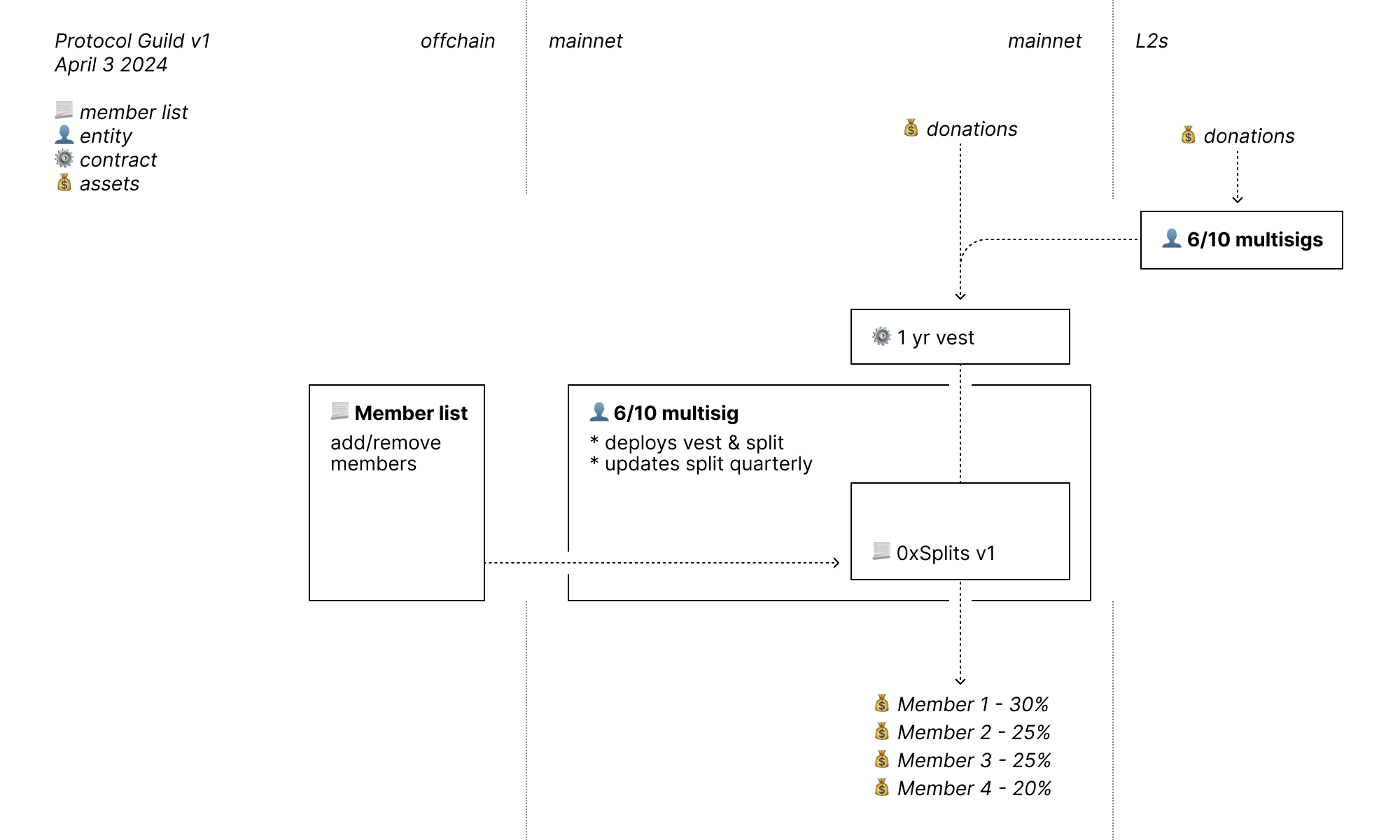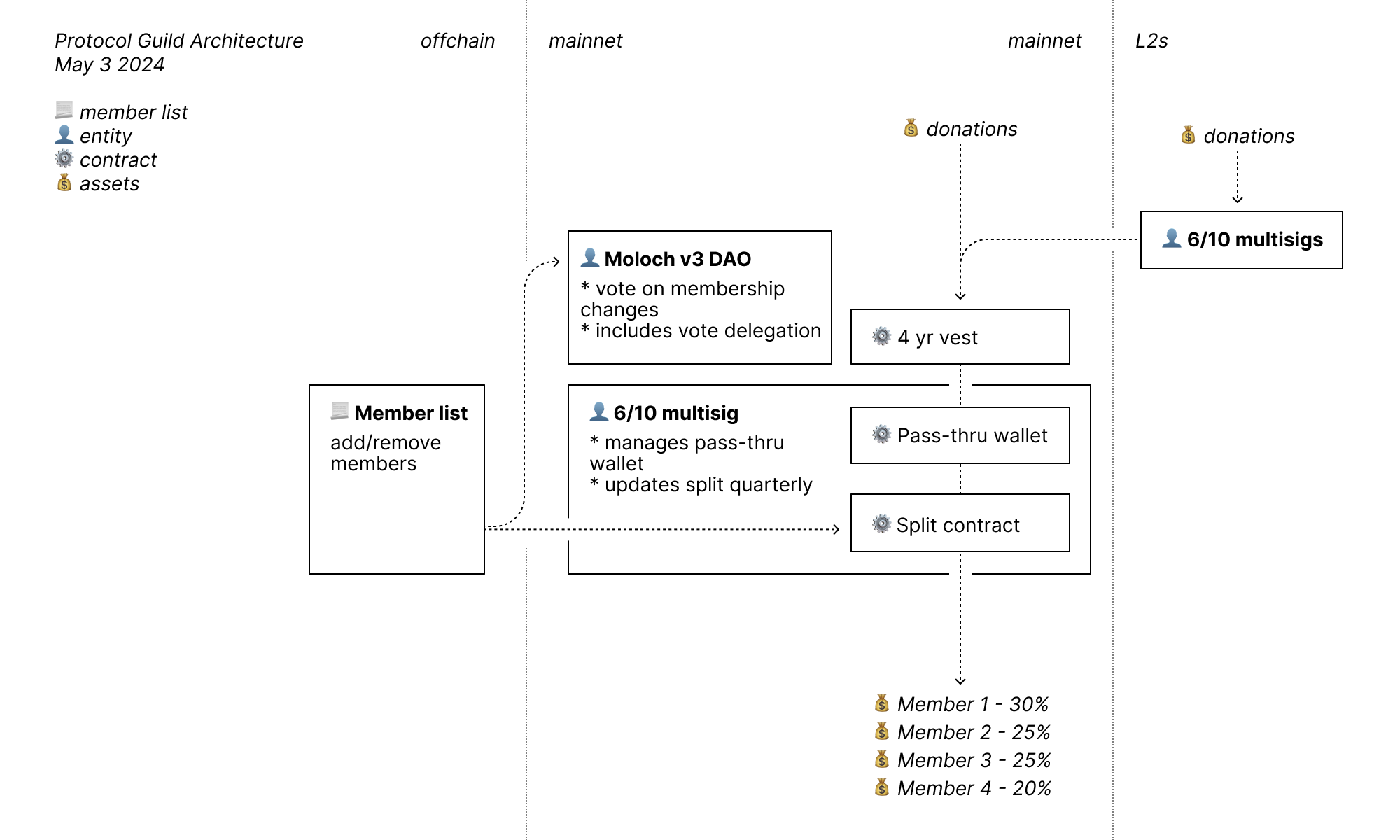Protocol Guild funds Ethereum core developers using Splits



A guild is a union of craftsmen who collectively advocate for themselves and their profession. Protocol Guild is that, for Ethereum core contributors, administered via the blockchain itself.
The Guild has received $30 million of cumulative donations (based on current asset prices) through the one-year pilot that began in May 2022. These funds were distributed directly to core devs, both rewarding and incentivizing their work on Ethereum's underlying technology.
The burning question: is Protocol Guild a DAO? When asked, Trent van Epps grinned. How about "onchain organization," he offered. Trent jokingly calls himself Ethereum’s "protocol consigliere" and is one of the members who helped to get the Guild off the ground.
The project harks back to October 2021, when the conundrum of fair pay for core development once again resurfaced as public debate. Actually, the issue is not just paying "fairly" per se — whatever that means — but paying enough to preempt key contributors from leaving for more lucrative employment.
"This is going to keep happening unless the Ethereum network can reward protocol developers proportionally to their value," Joseph Delong pointed out.
Looking back, Trent recalled the litany of concerns:
How do we retain core contributors over time? How do we keep people sticking around contributing to stewardship? How do we make sure that they are being taken care of and feel like they're not missing out on opportunities that they could otherwise be pursuing if they weren't working on this important core infrastructure?
In other words, how can the Ethereum community defray the opportunity cost of dedicating yourself to core development?
People dive into Ethereum fundamentals because 1) they care and 2) they find it intellectually rewarding. What pulls them away is pragmatism. "Oftentimes [it has been] a really rational decision to step outside of core development," Trent noted. People have families, or simply a natural desire to maximize their financial future.
Across the aisle, the teams and companies building on Ethereum need core devs to ensure the stability and advancement of the network. "It's crucial infrastructure, it's crucial for the ecosystem."
Tweet first, plan later
During that October 2021 conversation, Danny Ryan suggested, "Make it a social norm for all DAOs (and other network tokens) building on Ethereum to allocate 1.5% of their tokens to the individuals building and designing the L1 infrastructure they rely upon."
A couple years later, after the initial one-year pilot, the Protocol Guild Pledge embodies Danny's thought — albeit knocked down to a round 1%. So far, six projects have taken the Pledge. Protocol Guild also receives ad hoc donations. For example, Guild members were allocated 1.05% of Starknet's airdrop of STRK.
Before it was possible to start collecting donations, let alone institute the Pledge, someone needed to operationalize Danny's suggestion. "I was the person who took that tweet-length concept and fleshed it out into a longer written proposal," Trent told Splits.
He iterated on the idea with other core contributors over the next few months, eventually drafting an eligibility framework and identifying the requisite smart contracts. Trent hoped that Protocol Guild would "reduce some of the churn" and "bootstrap a solidarity primitive" that would lead to longer tenures of participation, thus maintaining institutional knowledge within Ethereum.
By early 2022, core contributors were convinced that Protocol Guild was worth a shot. Consequently, they needed funding infrastructure for their infrastructure funding effort. "We found contracts that worked and 0xSplits was one of them," Trent said. "It was a perfect fit."
I'm not a Solidity developer and I don't plan to be. 0xSplits was perfect in that we could just use these existing contracts off the shelf that were really performant and did exactly what we needed.
In collaboration with the nascent project, Splits created a vesting contract that suited the Guild's use case. "We want to encourage long-term stewardship," Trent said, "so this vesting component helps to provide future assurances for income, in addition to a stable pool of assets that can be distributed over time."
Another Splits tool has also come in handy: "Some of our members have started using Swapper, that's been helpful," Trent remarked. Glad to hear it 🫡
How Protocol Guild works
In its most basic form, Protocol Guild is a list of wallet addresses, between which pledged funds are split based on associated time-weights (what date a member became eligible) and full or part-time status, all controlled by a multisig contract. Prospective members are considered once they've been contributing to the Ethereum core protocol for at least six months continuously.

To start with, "every quarter we would update the Split with a list of addresses and the weights associated with them," Trent explained.
The first version is pretty simple. It was just the multisig, the Split, and the vesting contract feeding into the Split. The vesting contract is immutable — it holds assets for one year, and they linearly vest into the Split.
The multisig is, again, very straightforward. I think it's a 6-of-10 composed of members, and they just have authority over the Split of members and the weights. So every quarter we would update it. Obviously the multisig is the trusted component.

Now Protocol Guild is upgrading the setup:
What we wanted to avoid is offchain tracking of members, the addresses that they have, any weights associated with them. An offchain database introduces some trust assumptions about who has the authority to update the weights. The members wouldn't arbitrarily change around people's weights, but to prevent that from ever happening on purpose or by mistake, we wanted to bring the weights registry onchain.
What we've done over the last year is develop an intermediary contract, called just a registry contract, that holds some of this information onchain. And in doing so we prevent [meddling, whether intentional or otherwise]. I can't tweak these on my own, it's hardcoded, and anybody can poke this registry contract which then feeds into the Split. So that's the main difference [from v1 of Protocol Guild].
This is crypto 101. If you can, design mechanisms or ways of interacting socially within an organization that only expose the minimum amount of permissions that you absolutely need.
We don't decide the allocations. Anybody can claim from the Split at any time. Whereas with a traditional foundation you have these grants and they have to be distributed [by the organization], you can claim at any time when it suits you.
Trent has advice for would-be organizers of onchain organizations — or really any kind of collaborative project:
Start with as few parameters as possible. One thing we included is we have two tiers, there's a full-time and a part-time ranking. It's a full-weight and a half-weight, so you have a 0.5 multiplier. And even that very very basic parameter has produced more conversations [than anything else]. It should have just been full-time and we could have saved so many conversations. People are like, "Well what if we did 0.1 and 0.2 and 0.25," and all these different tiers — and it's like no, we should have just done full-time, and maybe in a couple years introduced more granular measures.
Simplicity is worth the design discipline that it requires.
Who donates to Protocol Guild?
Once the initial framework was in place, all Protocol Guild needed to start supporting Ethereum core devs was money to give them. Where to get it? Basically, members started knocking on doors, hats in hand. Trent recalls:
People always love to talk about "core devs are under-appreciated and we should really be supporting them." This sentiment is often really surface-level and fleeting around the time of whatever upgrade is happening. People remember, "Oh yeah, there are like humans who make this happen, and it's not this autonomous system that springs into existence."
It was a big question whether we could actually get people to remember the walk instead of just talking the talk. Around May 2022 is when we launched the contract and kind of opened up shop and were like, "Okay! Who wants to give us money?"
"It still exists on pure altruism and the people we can convince to donate to this thing," Trent said. "It's all voluntary." He's been pleasantly surprised by the enthusiasm. "We went to larger onchain treasuries that we felt would be open to funding something like this," and the response has been significant:
- The Arbitrum community has contributed $3.4 million;
- Lido DAO gave $2.8 million;
- Uniswap DAO gave $2.7 million;
- ENS DAO gave $1.8 million;
- Moloch DAO and Nouns DAO each contributed in excess of $700,000.
(All USD equivalents at the time of giving.)
As v2 of Protocol Guild approaches launch, the members will be making the rounds again. "We're hopefully gonna aim for $100 million to pass through the vesting contract each year," he told Splits.
You know who else can donate to Protocol Guild? You! Send a one-off donation or create your own Split to tithe from staking rewards.
Our first Q&A with Trent, from March 2023, is preserved below:
Trent Van Epps is a core contributor and steward to Protocol Guild. Protocol Guild is a collection of Ethereum contributors working to boost the incentives around stewarding the core protocol by maintaining an onchain registry of its membership which allows ecosystem sponsors to directly fund the membership, their work, the public good.
What problem does Protocol Guild use Splits to solve?
Splits gives the Protocol Guild collective necessary Schelling point attributes in our mission to fund core protocol contributors. Previously, there was no mechanism providing this and interested sponsors had to do their own ad hoc curation to fund a broad array of core contributors. We also use the vesting modules to create long-term contribution incentives.
How has Protocol Guild integrated Splits?
Protocol Guild's high-signal curation is made possible by the Mutable Split feature. With this we can periodically update the registry to reflect the current set of contributors & weights. More broadly, the contract architecture lends itself to iteration instead of forcing complete redesigns, eg. swapping in more trustless governance of split updates with a different set of non-Splits contracts, L2 forwarding contracts pointing to the mainnet split.
How has your experience been so far?
Splits has been a crucial part of our 1 year Pilot. $10mm from sponsors has been sent to the Guild vesting contract to date, with $5mm of that already distributed to Ethereum's core contributors via the vesting module. We haven't had any issues with the contracts, and the user interface is very well considered. The Splits team is a pleasure to work with: responsive to suggestions, thoughtful, and eager to build. We're excited to continue collaborating!